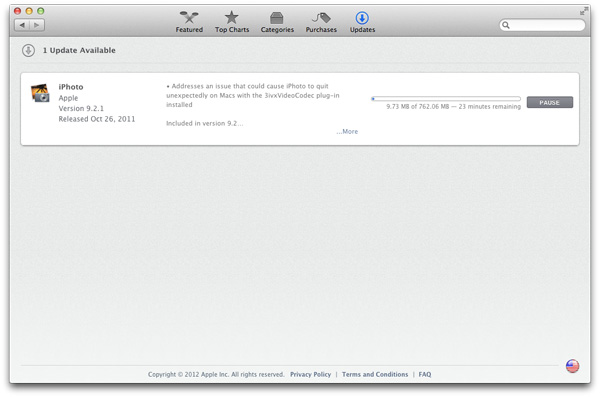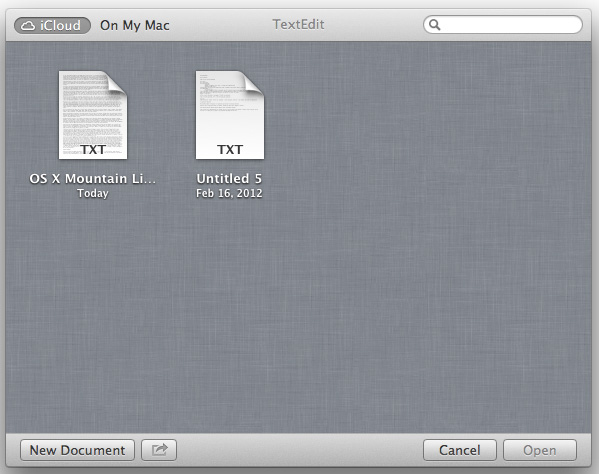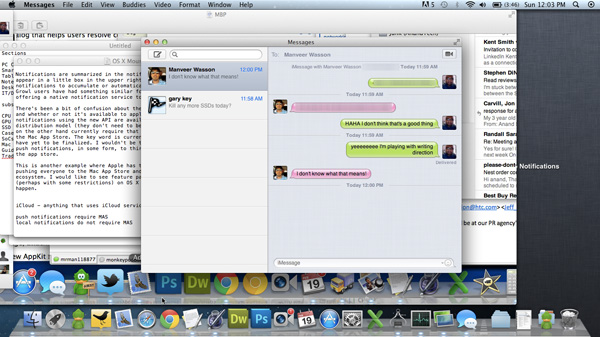Thoughts on the Mac OS X Mountain Lion Developer Preview
by Andrew Cunningham & Anand Lal Shimpi on February 19, 2012 7:40 PM EST- Posted in
- Mountain Lion
- Mac
- macOS
Software Updates & Moving Toward the Mac App Store
To be honest, I rarely use the Mac App Store. I appreciate it because it does let me quickly get Apple applications without fumbling for a restore DVD somewhere, but otherwise I get all of my non-Apple apps directly from the source. The app store makes sense to me on iOS because that's the only option we were presented with from the start, but even there I would appreciate the flexibility of installing apps from any source. On a Mac the opposite is true. Just as was the case on PCs, I've always grabbed and installed software on my Macs from a multitude of sources and I've never really wished there was a centralized, policed repository of Mac applications. That being said, I do understand and accept that I may be a part of a shrinking minority. Apple's most successful products have been those sold effectively as appliances. The MacBook Air took many steps in the same direction by offering no end user upgradeable CPU, memory, storage or battery options. With the MBA you're buying some sort of a Mac appliance hybrid. It's a good device (I'm typing this article on an MBA now), but in many ways it's an inflexible one.
My fear is that as Apple straddles this line between the old and the new, that it will step over too far into the walled garden/appliance territory. That OS X, just like iOS, will become a platform powered only by the app store. That isn't the reality today and I hope that it never will be, but the temptation is surely there. Apple gets a cut of all software sales through the Mac app store, it doesn't elsewhere. App stores are a way of continuing to profit off of a platform after you've sold the initial hardware and operating system. From a customer experience standpoint there's also significant motivation behind supporting only a centralized app store. With complete control of what can run on the platform, Apple could guarantee and maintain the level of experience that it's always been in pursuit of.
Again, today, this isn't a problem but there's definitely movement in that direction. Mountain Lion does away with Lion's Software Update mechanism and instead integrates that into the Mac App Store directly.

There's no change in functionality, just a change in physical location. I will admit that the software update tool always felt like it needed...updating, but I don't know that I would've put it in the MAS application.

Remember all of the new APIs that developers now have access to? A couple of them are only available to applications distributed via the Mac App Store. The big one is iCloud. Any application that interfaces with or uses iCloud is required to be in the MAS. It's the tradeoff you make when you start using Apple's cloud storage as a selling feature of your application. There are ways around this requirement (you could decouple any cloud storage features from your main application and simply offer the former through the app store) but it's a bifurcation of the Mac software feature set for the most part.
The notification story is a little different.
New Notifications API & Interface
Revamping notifications was a major part of the iOS 5 update last year and Apple decided to bring some of that to OS X. Mountain Lion sports a new iPad-like notification center that's accessible by performing a right to left, two finger swipe on a multitouch trackpad. The gesture is unique in that it's the first gesture that must be started at the very edge of the trackpad. A two finger right-left swipe starting in the middle or even an inch from the border of the trackpad is different entirely. To bring up the notifications menu you have to start the gesture at the very edge of the trackpad. It's easier to just start swiping off of the trackpad first, allowing the gesture to then continue onto the trackpad surface. The notification center gesture is very reminiscent of the PlayBook/webOS bezel gestures that have similar requirements for starting outside or at the beginning of the touch area.

Notifications are summarized in the notification center but as they happen they appear in a little box in the upper right of your screen. You can configure notifications to accumulate or automatically disappear after a short period of time. Growl users have had something similar for a while now, but Apple is now officially offering a native notification service to all developers.
There's been a bit of confusion about the new notifications API (NSUserNotification) and whether or not it's available to applications not in the Mac App Store. Local notifications using the new API are available to third party apps regardless of their distribution model (they don't need to be in the Mac App Store). Push notifications on the other hand currently require that the application is distributed only through the Mac App Store. The key word is currently because a lot of Mountain Lion decisions have yet to be finalized. I wouldn't be too surprised if Apple decides to open up push notifications, in some form, to third party applications not distributed through the app store.
This is another example where Apple has to carefully straddle the line between pushing everyone to the Mac App Store and not abandoning the rest of the Mac software ecosystem. I would like to see feature parity regardless of distribution model (perhaps with some restrictions) on OS X going forward, but I'm not sure that will happen.










96 Comments
View All Comments
Death666Angel - Monday, February 20, 2012 - link
I am not an Apple buyer, so I don't use OS X. I've seen it on he MacBook and tried it for 5 minutes and couldn't get anything to work. ^^ I'm sure it works for a lot of people, though.What I found a bit odd in your conclusion was that there is competition in the OS space. I really don't see that. As long as Apple doesn't open OS X up to non-Apple PCs, OS X is not a competition to Windows. The Mac sales in the US may look quite good, but world wide, OS X doesn't really play a role, as far as I know. I'd like to try OS X again, but I'm not going to cough up the money for an Apple PC to do it. :-)
colonelclaw - Monday, February 20, 2012 - link
I take care of a lot of Macs for friends and family. As an unscientific observation, those who have older hardware (some up to 10 years old, but mostly 4+ years old) don't care about not having the latest OS. Those on the newer hardware are always bugging me to 'upgrade' their systems (i.e put on Lion and everything Adobe makes for free).Consequently I would say not supporting older hardware is not a big deal. There seem to be 2 types of computer user in this world, those who want the latest and greatest of everything, and those who just don't care as long as it works.
Death666Angel - Monday, February 20, 2012 - link
Since you take care of those, you should make sure that everyone is running the latest software, if only to ensure that everyone is as secure as they can be. Newer OS isn't just for added features, it is also to close bugs, exploits etc. People not wanting newer software because their current one runs good enough are the same people who will get their credit card maxed by thieves.nortexoid - Monday, February 20, 2012 - link
Quibble: there's a section titled "Unsupported Macs" and then a list of Macs just below that. If one doesn't read the paragraph above (and there's no reason to think they *ought* to), one will be confused by the list.Andrew.a.cunningham - Monday, February 20, 2012 - link
Then it's a good thing you read the paragraph above, right? I mean, what are we all here for, if not to exchange information using words?Andrew.a.cunningham - Monday, February 20, 2012 - link
Sarcasm aside, though, your point is well-taken, and I tweaked the subhead. :-)repoman27 - Monday, February 20, 2012 - link
Neither the original article nor any of the user comments I read pointed out an obvious benefit of shifting the distribution of widely adopted apps to "App Store" models—namely a more unified software update interface. I fired up a client's MacBook the other day just to change a few system settings and configure her email client with a new account. Because she had only lightly used the machine in the past few weeks, I was confronted with 5 different auto-update dialogs in the space of 20 minutes. Most Windows machines I see have about a dozen startup processes or services designed to check for software updates automatically on top of Microsoft Update. For many small businesses that don't maintain dedicated update servers, have legacy equipment or less than stellar internet connections, the only option is to disable automatic update checking for virtually everything and then periodically perform manual updates of all the software on each machine.I kinda like the iOS way, where every now and then when I'm at home and on WiFi, I glance at my home screen, and I can see a little red badge on the App Store icon with a number telling me how many apps have available updates. I can peruse them first, then tap "Update All" and be done with it. It really should be this easy on PC's as well (and even better if you could just as easily roll back an app to a prior installed version if the update breaks something.) Apple providing a very low overhead push notification server that any developer can use to notify their users of updates, and a centralized way of downloading and installing those updates is one step closer to things just working the way they should.
In a previous comment, someone made the analogy to the changes the automotive industry has undergone in the past 30-40 years. I use this analogy all the time. For a while people lamented the perceived loss of ability to maintain their own cars, but the tradeoff is that most people drive vastly more reliable vehicles than they did a few decades ago and don't miss changing a water pump themselves one bit. I for one really hope that personal computers get to the point where they "just work" the way cars do these days. And despite the more proprietary nature of cars nowadays, the tinkerers and those that perform their own repairs are certainly far from extinct—they just had to acquire different tools and skill sets.
As for software developers not wanting to give Apple 30% of the retail take, unless they primarily sell directly and can scale well with demand, they often sacrifice more than that to whatever distribution channels they do use. In most instances (i.e. for the most popular apps), those not buying volume licenses (which aren't yet available for non-Apple apps in the Mac App Store anyway) tend to buy from a discount retailer. Between the discounted price and the fact that the retailer is taking a cut, we can deduce that the publisher has probably wholesaled the license at 70% or less of full retail.
Death666Angel - Monday, February 20, 2012 - link
Considering the kind of information my internet-machine has on me versus my car, I don't really see how they stack up. I don't want Apple or Microsoft or Google turning their OS into another Facebook.repoman27 - Monday, February 20, 2012 - link
Many cars already have embedded GPS and mobile communication hardware, microphones and cameras and other sensors. Some new models are touting built in Wi-Fi. Once you start browsing pron from you car, there really won't be much difference.And I don't really see how app stores could turn an OS into Facebook. Apple, Microsoft and Google all provide browsers, Microsoft and Google have search engines, and Apple has iTunes. I'm not sure what they'll learn about you from an OS level app store that they don't already know.
Death666Angel - Tuesday, February 21, 2012 - link
So, you store passwords, private information, handle money transactions through your car? If you don't see how a machine to enter the internet and community with the world is different from a vehicle, you clearly are not living on my plane of existence.As for the Facebook, you were saying that we should just let the companies run these black boxes and not worry about it. But I see that this would give these companies a chance to gather ever more information from us. Your argument that they already have stuff to gather such information isn't anything contrary to my stance.